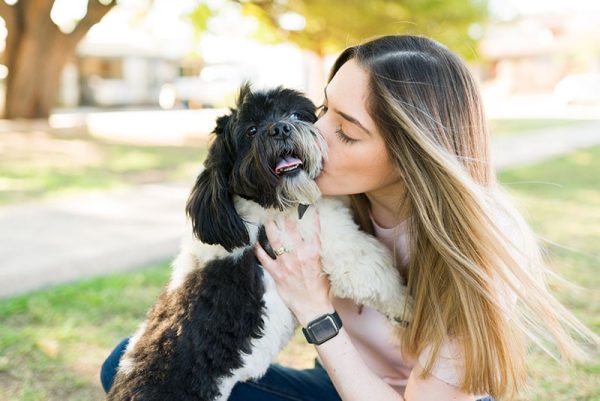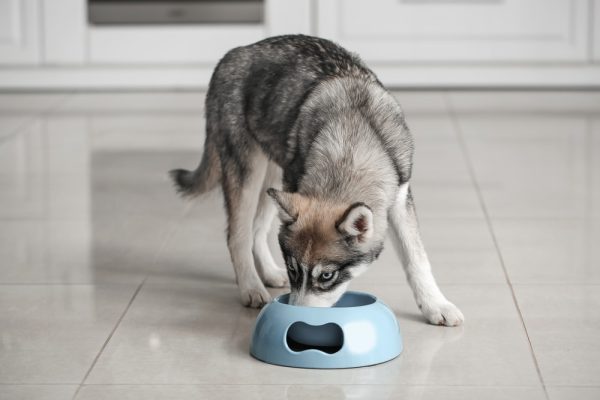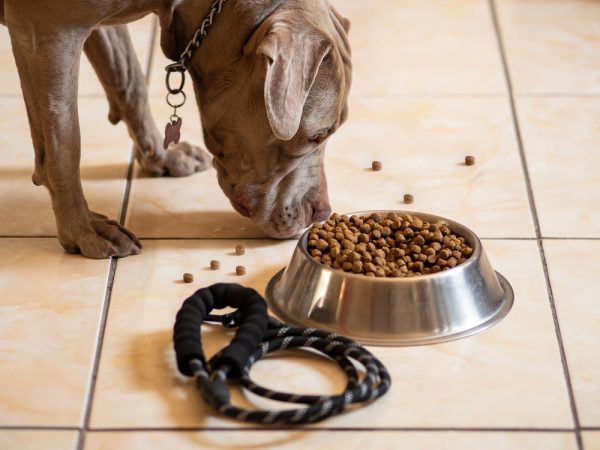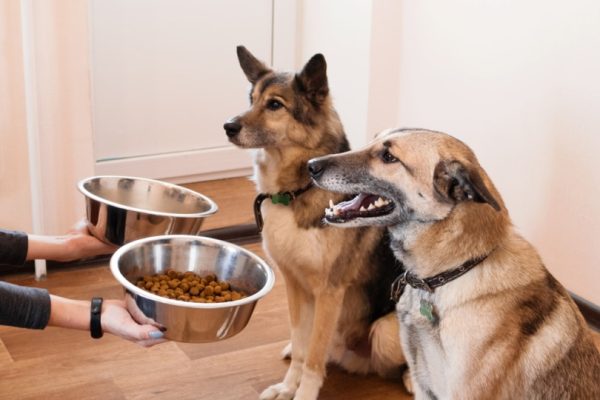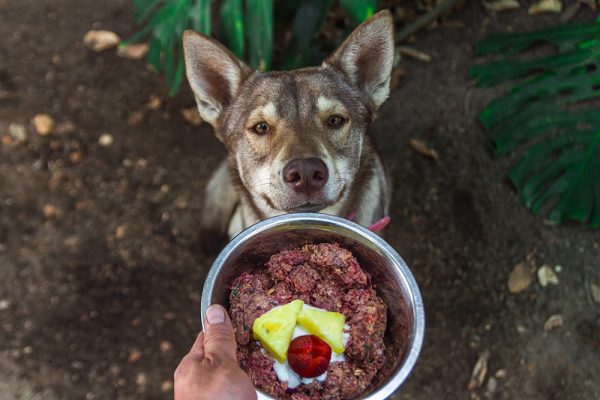Does your dog gag, retch, or smack their lips? Or have you noticed small puddles of clear fluid or undigested food on the floor? If so, your dog may be suffering from acid reflux – an uncomfortable condition that affects both humans and dogs alike.

What Is Acid Reflux?
Acid reflux (also known as gastroesophageal reflux disease or GERD) is a condition in which the stomach contents flow backward into the esophagus, the tube connecting a dog’s mouth to its stomach.
A dog’s stomach contains gastric acid and other digestive enzymes that help break down food. The mucosal lining of the stomach protects it from this strong acid, but the esophagus does not have the same protection. When a dog swallows, a ring of muscle around the bottom of the esophagus known as the lower esophageal sphincter (LES), relaxes to allow food and liquid to flow into the stomach. Acid reflux occurs when the sphincter doesn’t close properly and stomach acid flows back into the esophagus, causing it to become inflamed.

What Are the Signs of Acid Reflux in Dogs?
In humans, acid reflux causes acid indigestion (also known as heartburn), a burning sensation in the chest that occurs when stomach acid flows up into the esophagus. While dogs are unable to tell us if they experience heartburn, they can communicate their discomfort in other ways.
- Regurgitation
- Repeated swallowing
- Lip smacking
- Lip licking
- Retching
- Gagging
- Hypersalivation
- Loss of appetite
- Weight loss
It’s important to note that regurgitation is not the same as vomiting.
Regurgitation is the passive expulsion of water, food, and other material from the throat or esophagus. A dog may simply lower their head and food and water comes out. On the other hand, vomiting is an active expulsion of stomach contents. You’ll see warning signs such as drooling and heaving before a dog vomits.
If you suspect your pet is suffering from acid reflux, you should contact your vet directly for an assessment. They can provide you with more information and a care plan.
If you need to speak with a vet but can't get to one, head over to PangoVet. It's our online service where you can talk to a vet online and get the advice you need for your dog — all at an affordable price!
What Are the Causes of Acid Reflux in Dogs?
The most common causes of acid reflux in dogs include:
- Hiatal hernia: A hiatal hernia occurs when the upper part of a dog’s stomach bulges through the diaphragm into the chest cavity. In most cases, the condition is caused by a congenital (birth) defect although it can also be caused by trauma.
- General anesthesia: Many medications used during general anesthesia cause the lower esophageal sphincter to relax, allowing stomach contents to flow upwards into the esophagus. The type of surgery or position of the dog during surgery can also lead to acid reflux. If a dog is positioned with its head lower than its abdomen during surgery, stomach contents may leak out into the esophagus.
- Chronic vomiting: Chronic vomiting weakens the lower esophageal sphincter, resulting in acid reflux.
- Gastric atony (delayed gastric emptying): When the stomach doesn’t empty properly, acid levels increase and the function of the lower esophageal sphincter is affected, potentially causing acid reflux.


How Is Acid Reflux Diagnosed?
Your veterinarian may suspect acid reflux based on your dog’s history (regurgitation, lip-smacking, etc.), recent general anesthesia, or if your dog has a history of chronic vomiting. If your veterinarian suspects that your dog has this condition, and tests to rule out other conditions that may be responsible for your dog’s clinical signs have come back clear, you’ll likely be referred to a veterinary specialist for a procedure known as esophagoscopy.
During this procedure, a flexible tube-like device with a light and a camera, known as an endoscope, is inserted into the dog’s esophagus under general anesthesia. This allows the veterinary specialist to visualize the lining of the esophagus and check for esophagitis (inflammation of the esophagus).
How Do I Care for a Dog With Acid Reflux?
Before starting any treatment, it’s important to consult a veterinarian who can accurately diagnose the condition and provide appropriate guidance based on your dog’s specific needs.
In cases where an underlying anatomical abnormality, such as a hiatal hernia, is causing acid reflux, surgery is usually recommended to correct the issue. In other instances, caring for a dog with acid reflux involves a combination of dietary management and medication.
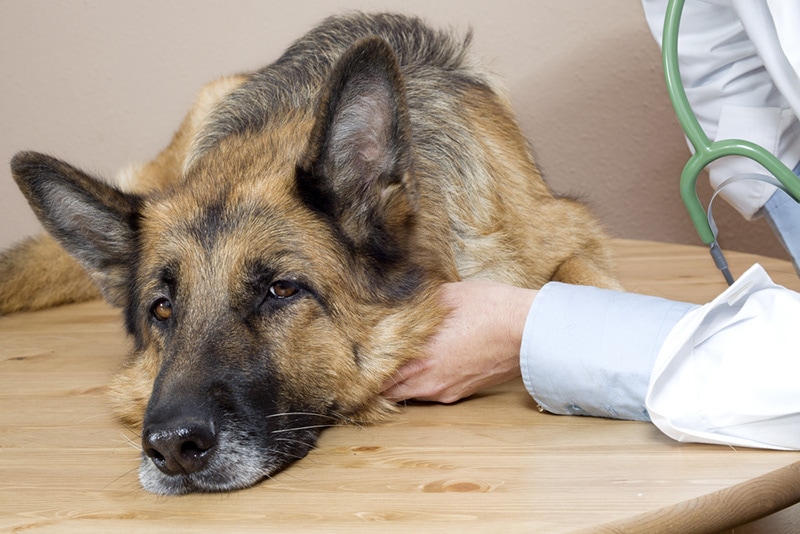
Dietary Management
Dogs with acid reflux should be fed a low-fat diet. Fat increases the time it takes for the stomach to empty and stimulates gastric acid secretion.
Feeding small, frequent meals throughout the day instead of one large meal may also help.
Medication
There are several types of medications that are used to treat acid reflux in dogs. These include:
| Proton pump inhibitors: |
Proton pump inhibitors (PPIs) work by reducing the amount of stomach acid produced by the glands in the lining of the stomach. By lowering stomach acid levels, they reduce acid reflux into the esophagus.
|
| Motility agents: |
Dogs with acid reflux may also benefit from prokinetic agents. Prokinetics help strengthen the lower esophageal sphincter and cause the contents of the stomach to empty faster. This allows less time for acid reflux to occur.
|
| Coating agents: |
Sucralfate is often prescribed to dogs with acid reflux. Sucralfate forms a protective coat on the surface of the esophagus.
|
Be sure to follow your vet’s instructions regarding the dosage and administration of any prescribed medications.

Frequently Asked Questions (FAQ)
What is the prognosis for dogs with acid reflux?
The prognosis for dogs with acid reflux is good with the right treatment. Some dogs require a short course of treatment, while others need to stay on medication long-term.
Are certain breeds of dogs more prone to acid reflux?
Although any breed of dog can develop acid reflux, brachycephalic (flat-faced) dogs such as English Bulldogs and French Bulldogs, are more susceptible to the condition.

Summary
Just like humans, dogs get acid reflux too. Regurgitation, repeated swallowing, lip smacking, lip licking, retching, and gagging, are all potential signs of this uncomfortable and sometimes painful condition. If you notice that your dog is showing any of these signs, it’s important to seek veterinary attention. Left untreated, acid reflux can result in esophagitis (inflammation of the esophagus). However, with the correct treatment, the condition carries a good prognosis.
Featured Image Credit: ALEX_UGALEK, Shutterstock



